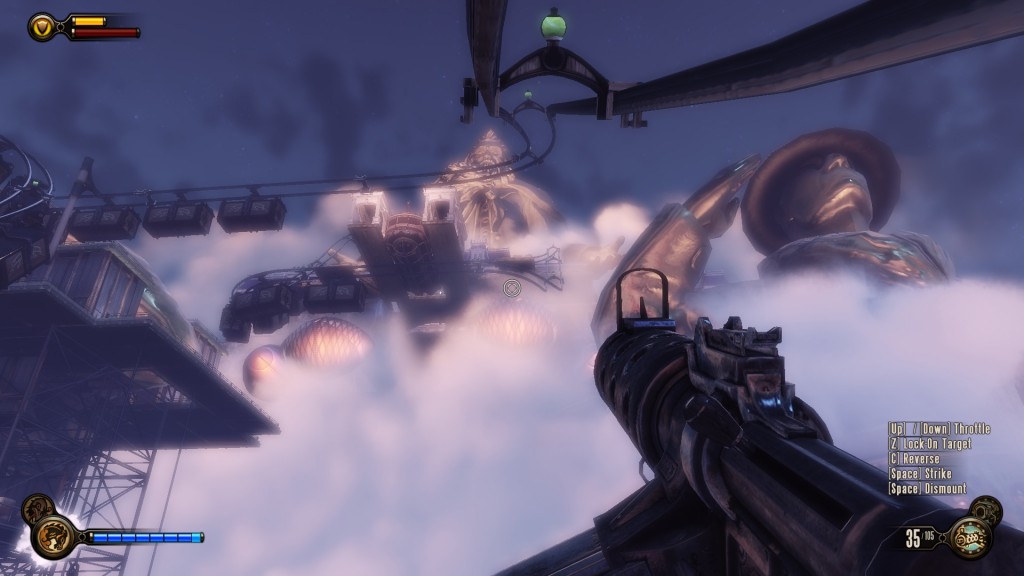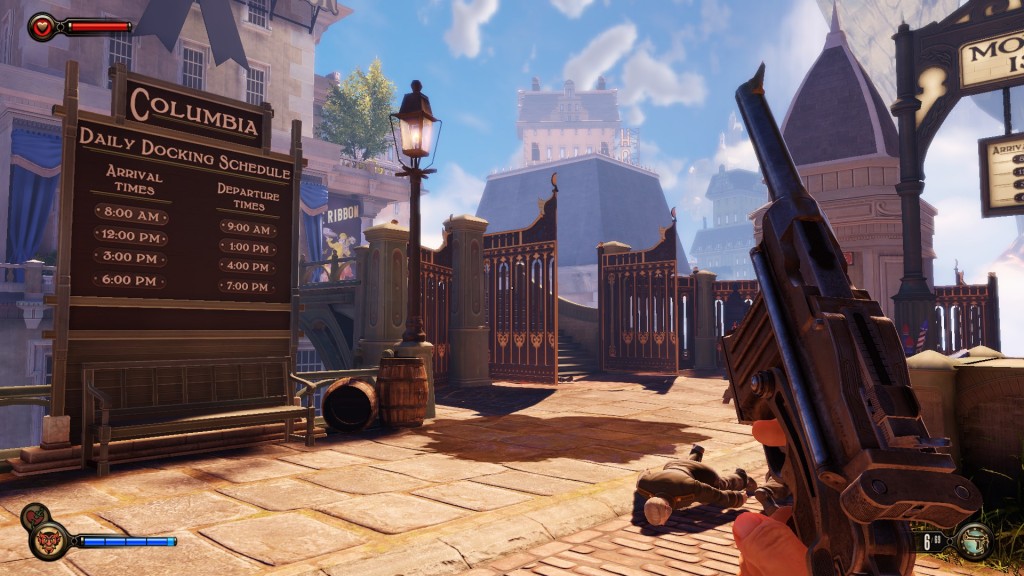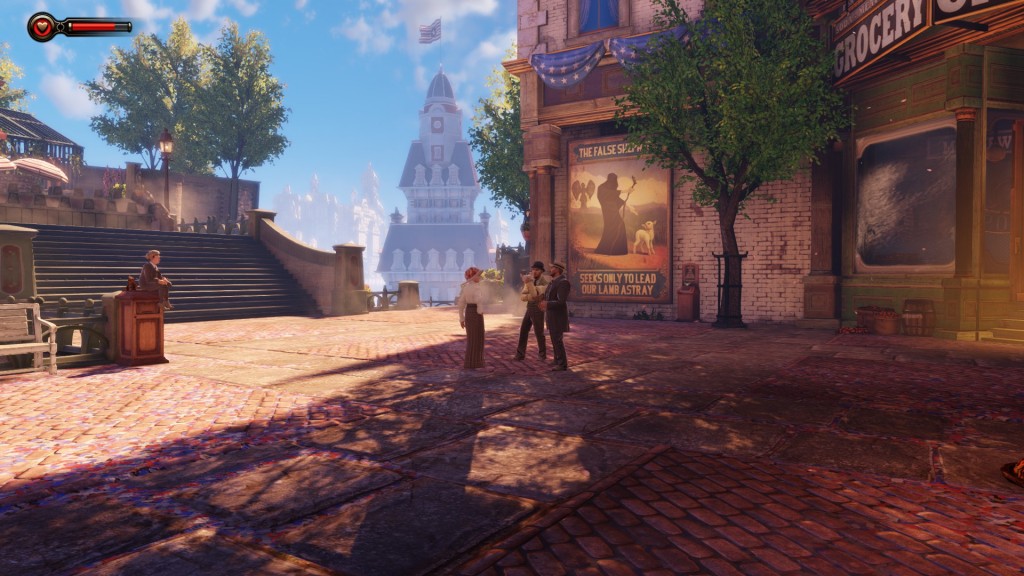- BioShock Infinite: The Verdict
- Wiping away debts: the BioShock Infinite spoiler post
“Bring us the girl, and wipe away the debt.”
The year is 1912. With those words ringing in his ears, Booker DeWitt, washed-up private detective and protagonist of Irrational Games’ BioShock Infinite, makes his way into the flying city of Columbia. On his shoulders lie several burdens: the fate of Elizabeth, the young woman he’s been tasked to bring back to New York. His own destiny, as it becomes intertwined with hers. And lastly, the weight of the BioShock franchise, one of the most acclaimed in gaming.
Not playing much of the previous BioShock games (1) did nothing to water down my expectations for BI, a game whose promised features read like my wishlist. A game that gives players an array of special powers, and rewards them for ingenuity? An original setting, layering vibrant, imaginative mad science atop an underused historical era? A companion character, Elizabeth, for us to like and grow attached to? Sign me up! Read on to find out (spoiler-free) how the game fared against my hopes.
The Gameplay

At its core, BI is a traditional, linear run-and-gun shooter – but what a superb one it is. There is no stealth, no non-lethal option, no alternate paths through levels. There are a few peaceful sections, but they don’t last long: this is an action game through and through. What makes it so good?
First, the most basic gameplay tasks – “running” and “gunning” – are rock solid. Combat is fast and fluid, as Booker snaps off hurried shots, evades oncoming enemies, or sprints to better vantage points. This is crucial – because I spent firefights moving around and taking advantage of each area’s particular terrain, the game never struck me as repetitive in the way that cover shooters do. BI’s weapons are fairly standard (pistol, shotgun, SMG, semi-automatic rifle, sniper rifle, etc), but feel well differentiated from one another. From what I’ve read, the weapons also do a good job of catering to different playstyles. And the game’s difficulty (on Medium) felt just right for me – tough enough to be tense and challenging, but not so tough as to slip into frustration.
On top of that solid foundation, BI adds its secret ingredient – the interplay between players’ available tools. These include guns; special powers called vigours, which allow Booker to conjure up lightning, fireballs, swarms of crows, and more; and “sky lines” that can whisk Booker around at dazzling speed. At their most basic, vigours are excellent at stunning or suppressing enemies, giving Booker the chance to line up a killing shot or move into a flanking position. The beauty lies in the details, which change from encounter to encounter. Here’s how they might work:
1. The problem: I’m up against a plaza full of enemy soldiers, my health is running low, and the nearest medikit is halfway across the square. One possible solution: jump onto the sky line for a roller-coaster ride to the medikit, drop down and grab it, then jump back onto the sky line to see if I can pick off the enemy one at a time.
2. The problem: a sniper has me pinned down. How to buy time so I can find him? Possible solutions: use a vigour that will repel bullets for a few precious seconds… and if I’ve already located him, I can distract him with a murder of swarming, pecking crows while I take aim.
3. The problem: It’s my turn to snipe, but I don’t want to be mobbed while I aim the cumbersome rifle. One possible solution: lay down a belt of electric traps to stun onrushing enemies, and perhaps mix in the killing power of an incendiary trap.
4. The problem: There’s a flying skiff approaching, chock full of enemy soldiers. Possible solutions: “possess” a soldier on the skiff so he’ll attack his comrades… or just ride the sky lines up to the skiff, jump down to its deck, and use a vigour to launch its crew overboard.
BI’s combat mechanics aren’t perfect – for instance, a certain boss enemy was underwhelming, once I worked out how to stunlock it. And BI suffers from a glaring, inexplicable technical flaw: there is no way to manually save the game. If real life intrudes, the player is out of luck: he or she must (a) fight to the next checkpoint, (b) backtrack to an area transition in order to trigger an auto-save, or (c) lose progress. This prevents BI from being played in short bursts, and can make it a hassle to schedule; I recommend players budget at least an hour, preferably two, per session.
Still, from a mechanical perspective, BI more than lived up to my hopes. Energetic and intelligent, this was exactly what I wanted from an old-school shooter.
The Storytelling
Unfortunately, BI doesn’t tell its story with the same grace with which it delivers its gameplay. While the story and setting contain interesting ideas aplenty (2), I do not think they match the sum of their parts. Partly, this is an issue of pacing and coherence: some plot threads (and one boss battle!) feel like vestiges that Irrational couldn’t bear to cut, yet they still take up valuable screen time. And partly, it’s an issue of implementation. For instance, I found the game’s opposition lacking: BI’s main villain inspires contempt, rather than respect or fear. More problematically, while BI reaches high with its political themes, they are neither subtle nor deep, and that robs them of any meaningful message.
Where the story shines is as the episodic adventures of Booker and Elizabeth. Both characters are archetypes, but so well-written and well-voiced they rise far above stereotype. We can’t see Booker’s face or body language, but his personality emerges through dialogue, muttered asides, and the observations pasted across loading screens. When we meet him, Booker is gruff, earthy, practical; the sort of man who mutters, “Just ‘cause a city flies don’t mean it ain’t got its fair share of fools.” Elizabeth is his foil: youthful, innocent, and full of joy in being alive, her personality emerges as she smiles, scowls, and sings. Together, they play off one another in scripted, dramatic moments; in quiet ones; even in a couple that are laugh-out-loud funny. As the game progresses, they grow, and change, and change one another; and watching these character arcs unfurl was perhaps my single favourite thing about BI.
(As an aside, I covered gameplay and story separately as I feel they really are distinct. Unlike, say, Ico, Digital: A Love Story, or XCOM, I don’t think BI’s gameplay forms a huge part of the story experience. The gameplay consists of shooting enemies; the storytelling consists of seeing/exploring the world, listening to dialogue, and viewing scripted sequences. The major exception is that Elizabeth tosses medikits and supplies to Booker during combat, which helps the player’s – and by extension, Booker’s – attachment to her. A few commentators have wondered whether gameplay and story should have been better integrated; I personally have no problem compartmentalising them, but neither do I think this is an especial strength of the game.)
Conclusions
At the end of the day, BioShock Infinite is neither a perfect game, nor, I would argue, an epoch-making one. It has real flaws, most notably an awkward save system and a story whose ambition exceeds its implementation. But it remains a very good game: a mechanically excellent run-and-gun shooter in the company of two characters I liked and cared about, and whose story arc I found deeply satisfying. I walked away from BI pleased, entertained, and a new fan of the series; and I look forward to diving into the earlier BioShock games.
Finished the game? Check out my spoiler postscript, in which I elaborate on what I think worked – and what didn’t work – about the game’s story.
(1) I’ve played the original BioShock but did not get very far. I have not played BioShock 2.
(2) In particular, Columbia is a vivid, often beautiful setting. During the peaceful parts of the game, I would prowl about as the world’s most heavily armed tourist, gaping at the scenery, chuckling at the boys surreptitiously puffing at cigarettes in the corner, eavesdropping on muscle-men at the beach and on families out for a picnic. I wouldn’t mind revisiting it (or something similar) in an adventure game or RPG.
Resources
Buy BioShock Infinite from Amazon US
If you’ve played the game, you’ll appreciate this meme
The basis of my review
Length of time spent with the game: Approximately 21 hours.
What I have played: One completed playthrough on Medium difficulty. I briefly tried Hard difficulty and discovered it wasn’t for me.
What I have not played: The Easy, Hard, and 1999 difficulty settings.
Note: the above comments are based on a review copy supplied by BioShock Infinite’s publisher, 2K Games.





3 thoughts on “BioShock Infinite: The Verdict”